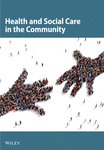The continuing care guidelines and primary and community health services
Abstract
The confirmation of NHS responsibilities for continuing health care has important implications for primary and community health services. In early 1996, during the period of consultation on draft local policies and eligibility criteria, exploratory interviews were carried out with general practitioners (GPs), community nursing managers, primary care development officers and social services purchasers in three health authority areas. The interviews indicated that few GPs had responded to local consultation and were only slowly becoming aware of the implications for the provision and purchasing of primary and community health services. Moreover, local continuing care policies had apparently not addressed two issues which GPs and community nursing staff indicated were currently highly problematic: their responsibilities in relation to independent sector residential and nursing home patients; and the consequences for primary health and community nursing services of hospital discharge decisions. The need for purchasers and commissioners of health services, whether health authorities or GPs, to begin collecting information on patients' potential needs for continuing care services was widely recognised as an urgent priority.




